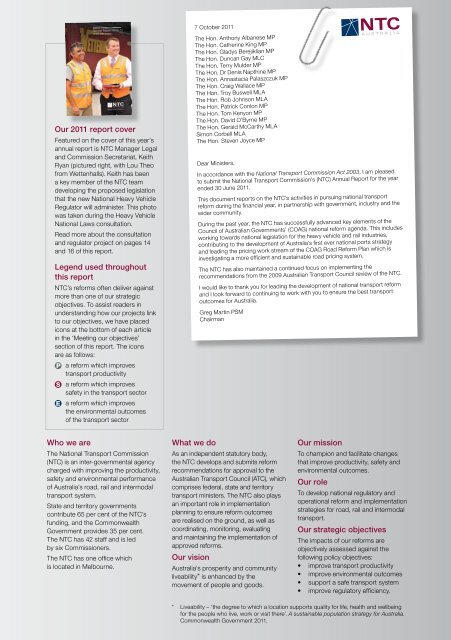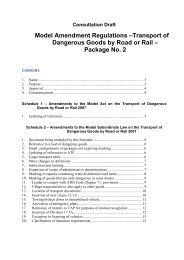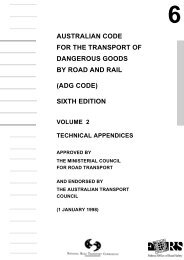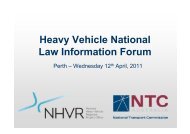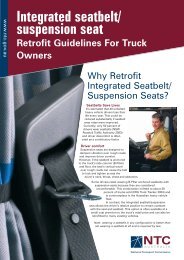2011 Annual Report - National Transport Commission
2011 Annual Report - National Transport Commission
2011 Annual Report - National Transport Commission
You also want an ePaper? Increase the reach of your titles
YUMPU automatically turns print PDFs into web optimized ePapers that Google loves.
Our <strong>2011</strong> report cover<br />
Featured on the cover of this year’s<br />
annual report is NTC Manager Legal<br />
and <strong>Commission</strong> Secretariat, Keith<br />
Ryan (pictured right, with Lou Theo<br />
from Wettenhalls). Keith has been<br />
a key member of the NTC team<br />
developing the proposed legislation<br />
that the new <strong>National</strong> Heavy Vehicle<br />
Regulator will administer. This photo<br />
was taken during the Heavy Vehicle<br />
<strong>National</strong> Laws consultation.<br />
Read more about the consultation<br />
and regulator project on pages 14<br />
and 16 of this report.<br />
Legend used throughout<br />
this report<br />
NTC’s reforms often deliver against<br />
more than one of our strategic<br />
objectives. To assist readers in<br />
understanding how our projects link<br />
to our objectives, we have placed<br />
icons at the bottom of each article<br />
in the ‘Meeting our objectives’<br />
section of this report. The icons<br />
are as follows:<br />
a reform which improves<br />
transport productivity<br />
a reform which improves<br />
safety in the transport sector<br />
a reform which improves<br />
the environmental outcomes<br />
of the transport sector<br />
Who we are<br />
The <strong>National</strong> <strong>Transport</strong> <strong>Commission</strong><br />
(NTC) is an inter-governmental agency<br />
charged with improving the productivity,<br />
safety and environmental performance<br />
of Australia’s road, rail and intermodal<br />
transport system.<br />
State and territory governments<br />
contribute 65 per cent of the NTC’s<br />
funding, and the Commonwealth<br />
Government provides 35 per cent.<br />
The NTC has 42 staff and is led<br />
by six <strong>Commission</strong>ers.<br />
The NTC has one office which<br />
is located in Melbourne.<br />
7 October <strong>2011</strong><br />
The Hon. Anthony Albanese MP<br />
The Hon. Catherine King MP<br />
The Hon. Gladys Berejiklian MP<br />
The Hon. Duncan Gay MLC<br />
The Hon. Terry Mulder MP<br />
The Hon. Dr Denis Napthine MP<br />
The Hon. Annastacia Palaszczuk MP<br />
The Hon. Craig Wallace MP<br />
The Hon. Troy Buswell MLA<br />
The Hon. Rob Johnson MLA<br />
The Hon. Patrick Conlon MP<br />
The Hon. Tom Kenyon MP<br />
The Hon. David O’Byrne MP<br />
The Hon. Gerald McCarthy MLA<br />
Simon Corbell MLA<br />
The Hon. Steven Joyce MP<br />
Dear Ministers,<br />
In accordance with the <strong>National</strong> <strong>Transport</strong> <strong>Commission</strong> Act 2003, I am pleased<br />
to submit the <strong>National</strong> <strong>Transport</strong> <strong>Commission</strong>’s (NTC) <strong>Annual</strong> <strong>Report</strong> for the year<br />
ended 30 June <strong>2011</strong>.<br />
This document reports on the NTC’s activities in pursuing national transport<br />
reform during the financial year, in partnership with government, industry and the<br />
wider community.<br />
During the past year, the NTC has successfully advanced key elements of the<br />
Council of Australian Governments’ (COAG) national reform agenda. This includes<br />
working towards national legislation for the heavy vehicle and rail industries,<br />
contributing to the development of Australia’s first ever national ports strategy<br />
and leading the pricing work stream of the COAG Road Reform Plan which is<br />
investigating a more efficient and sustainable road pricing system.<br />
The NTC has also maintained a continued focus on implementing the<br />
recommendations from the 2009 Australian <strong>Transport</strong> Council review of the NTC.<br />
I would like to thank you for leading the development of national transport reform<br />
and I look forward to continuing to work with you to ensure the best transport<br />
outcomes for Australia.<br />
Greg Martin PSM<br />
Chairman<br />
What we do<br />
As an independent statutory body,<br />
the NTC develops and submits reform<br />
recommendations for approval to the<br />
Australian <strong>Transport</strong> Council (ATC), which<br />
comprises federal, state and territory<br />
transport ministers. The NTC also plays<br />
an important role in implementation<br />
planning to ensure reform outcomes<br />
are realised on the ground, as well as<br />
coordinating, monitoring, evaluating<br />
and maintaining the implementation of<br />
approved reforms.<br />
Our vision<br />
Australia’s prosperity and community<br />
liveability* is enhanced by the<br />
movement of people and goods.<br />
Our mission<br />
To champion and facilitate changes<br />
that improve productivity, safety and<br />
environmental outcomes.<br />
Our role<br />
To develop national regulatory and<br />
operational reform and implementation<br />
strategies for road, rail and intermodal<br />
transport.<br />
Our strategic objectives<br />
The impacts of our reforms are<br />
objectively assessed against the<br />
following policy objectives:<br />
• improve transport productivity<br />
• improve environmental outcomes<br />
• support a safe transport system<br />
• improve regulatory efficiency.<br />
* Liveability – ‘the degree to which a location supports quality for life, health and wellbeing<br />
for the people who live, work or visit there’. A sustainable population strategy for Australia.<br />
Commonwealth Government <strong>2011</strong>.


